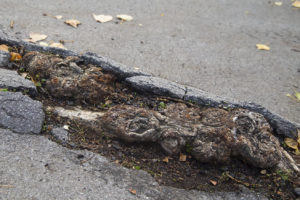
The subject is actually a matter of confusion for some. For one, some would suggest that it is the property owner’s responsibility to maintain trees on their land. On the other hand, others feel that the sidewalk owner may bear the blame if someone falls. A recent New Jersey Appellate decision provides some insight into this issue.
Injured on Uneven Sidewalk
Shatkin v. McCarthy, N.J. Super. App. Div. was just decided by the New Jersey Appellate Division last month. Although the decision is available online, there is a notation that it is not a published case. Accordingly, the legal opinion is not considered precedential and is only binding on the named parties.
For starters, let’s go over some facts as presented in the court’s decision. The case involves a jogger who was injured when he fell on an uneven sidewalk. The sidewalk was elevated because of the growth of tree roots pushing it up.
In any case, it was determined that the local municipality was responsible for the sidewalk. Notwithstanding, the tree was on a private homeowner’s property. According to an engineering expert, the roots raised the slap approximately two inches.
The jogger filed a premises liability claim against both the municipality and the homeowners. Meanwhile, an investigation was conducted to determine culpability for the accident. This included an examination of the site and records. At the same time, the homeowner was deposed.
During the homeowner’s deposition, it was determined that the family owned the home for thirty years. They denied planting the tree. Additionally, no one else had ever complained of the uneven sidewalk. The homeowners admitted they never reported the problem to the municipality.
Be that as it may, the municipality checked its own records regarding the tree with extended roots. Although their files only dated back to 1993, there was no indication that the municipality had planted the tree. However, the municipality should have known about the dangerous condition. They settled the claim before it reaching court.
Claim against the Homeowner
The injured jogger’s negligence claim against the homeowner was dismissed by a summary judgment motion at the trial level. Premises liability claims against property owners regarding overgrown tree roots are only available in certain situations.
According to New Jersey case law, the homeowner would not be held liable if the hazardous condition is natural. However, if the condition is “artificial or one precipitated by the property owner’s affirmative act,” there may be a case against the homeowner.
How does this pertain to this matter? If it could be proven that the property owners planted a tree in a location where the roots could ultimately cause a problem, they would have been liable. There was no evidence they did so. In fact, the investigation was unable to show who planted the tree. Accordingly, the claimant could only recover damages from the municipality.
Contact Us
The Law Offices of Anthony Carbone has extensive experience handling sidewalk cases. We have the resources to investigate a claim on your behalf. Contact us